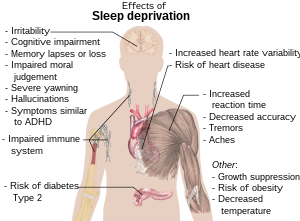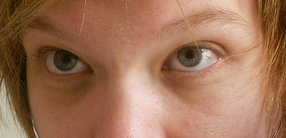Sleep deprivation
Sleep deprivation, also known as sleep insufficiency or sleeplessness, is the condition of not having enough sleep.

| Sleep deprivation | |
|---|---|
| Medical specialty | Sleep medicine |
| Symptoms | Fatigue, eye bags, poor memory, irritable mood, weight gain |
| Complications | Car and work accidents, weight gain, cardiovascular disease |
| Causes | Insomnia, sleep apnea, stimulants (caffeine, amphetamine), voluntary imposition (school, work), mood disorders |
| Treatment | Cognitive behavioral therapy, caffeine (to induce alertness), sleeping pills |
The condition affects the brain and its cognitive function. The condition can be either chronic or acute. wikit:Paradoxically, sleep deprivation can be used to treat certain disorders, such as clinical depression. Sleep deprivation has also been used as a form of torture. Multiple factors can cause or contribute to sleep deprivation including poor sleep hygiene, lifestyle choices, work obligations, sleep disorders, and other medical conditions. Sleep deficiency may be caused by other sleep disorders or medical conditions. For example, sleep apnea, a breathing disorder that induces dozens of nightly awakenings, may hinder both sleep duration and quality. Other medical or mental health problems, such as pain or general anxiety disorder, can interfere with the quality and quantity of sleep.[2]


Generally, sleep deprivation may result in:[3][4][5]
- aching muscles[6]
- confusion, memory lapses or loss[4][7]
- depression[7]
- development of false memories
- hallucinations[7]
- hand tremor[8]
- headaches
- malaise
- stye
- periorbital puffiness, commonly known as "bags under eyes" or eye bags
- increased blood pressure[9][10]
- increased stress hormone levels[10]
- increased risk of diabetes[10]
- increased risk of fibromyalgia[11]
- irritability[3]
- nystagmus (rapid involuntary rhythmic eye movement)[12]
- obesity[10]
- seizures[13]
- temper tantrums in children[3]
- yawning[3]
- mania[14]
- symptoms similar to:
Causes
changeThere are many reasons why a person may not get enough sleep. Examples include:
- shift work
- meeting deadlines
- a sleeping environment that is noisy or not the right temperature
- using electronic devices, like a phone, close to bedtime or keeping them in the bedroom
- medical problems, such as depression, sleep apnea, or chronic pain
- caring for another person during the night
Types of Sleep Deprivation
changeSleep deprivation and sleep insufficiency may be categorised in different ways depending on a person’s circumstances.
- Acute sleep deprivation refers to a short period, usually a few days or less, when a person has a significant reduction in their sleep time.
- Chronic sleep deprivation, also known as insufficient sleep syndrome, is defined by the American Academy of Sleep Medicine as curtailed sleep that persists for three months or longer.
- Chronic sleep deficiency or insufficient sleep can describe ongoing sleep deprivation as well as poor sleep that occurs because of sleep fragmentation or other disruptions.
References
change- ↑ 1.0 1.1 "How Much Sleep Do I Need?". CDC.gov. Centers for Disease Control and Prevention (CDC). 14 September 2022. Archived from the original on 2 November 2023.
Last Reviewed: September 14, 2022. Source: National Center for Chronic Disease Prevention and Health Promotion, Division of Population Health.
- ↑ Jones, Alice (2019-06-26). "Sleep Disorders and Sleep Problems". Retrieved 2021-09-12.
- ↑ 3.0 3.1 3.2 3.3 3.4 "Sleep deprivation". betterhealth.vic.gov.au. Archived from the original on 2009-08-20. Retrieved 2015-03-28.
- ↑ 4.0 4.1 Read, Bryan F. "Sleep Deprivation". St. Paul's School for Girls, Brooklandville, Maryland. Archived from the original on 2008-02-09.
- ↑ "Consequences of sleep deprivation". Sleep Education. Retrieved 2021-09-12.
- ↑ Morin, Charles M.; Espie, Colin A. (2003). Insomnia. New York: Kluwer Academic/Plenum Publ. p. 28 death. ISBN 978-0-306-47750-8.
- ↑ 7.0 7.1 7.2 National Institute of Neurological Disorders and Stroke – Brain Basics: Understanding Sleep Archived 2007-10-11 at the Wayback Machine. ninds.nih.gov
- ↑ Jones, Dylan M.; Smith, Andrew P. (1992). Handbook of Human Performance. London: Acad. Press. p. 240. ISBN 978-0-12-650352-4.
- ↑ "The Human Brain – Sleep and Stress". Fi.edu. 27 September 2007. Archived from the original on 2013-01-07. Retrieved 2012-08-13.
- ↑ 10.0 10.1 10.2 10.3 "Harvard Heart Letter examines the costs of not getting enough sleep – Harvard Health Publications". Health.harvard.edu. 31 May 2012. Archived from the original on 2011-05-09. Retrieved 2012-08-13.
- ↑ "The Role of Magnesium in Fibromyalgia". Web.mit.edu. Retrieved 2012-08-13.
- ↑ Citek, K; Ball, B; Rutledge, DA (2003). "Nystagmus testing in intoxicated individuals" (PDF). Optometry (St. Louis, Mo.). 74 (11): 695–710. PMID 14653658. Archived from the original (PDF) on 2013-06-17. Retrieved 2015-03-28.
- ↑ Engel, Jerome; Pedley, Timothy A.; Aicardi, Jean (2008). Epilepsy: A Comprehensive Textbook. Lippincott Williams & Wilkins. p. 77. ISBN 978-0-7817-5777-5.
- ↑ T A Wehr (1991-10-01). "Sleep-loss as a possible mediator of diverse causes of mania". The British Journal of Psychiatry : The Journal of Mental Science. 159 (4). Bjp.rcpsych.org: 576–578. doi:10.1192/bjp.159.4.576. PMID 1751874. S2CID 22945599. Retrieved 2015-01-30.
- ↑ Neural Link Between Sleep Loss And Psychiatric Disorders Archived 2009-02-28 at the Wayback Machine. ts-si.org (24 October 2007)